Behind the scenes: Making the Cadbury Give a Doubt website
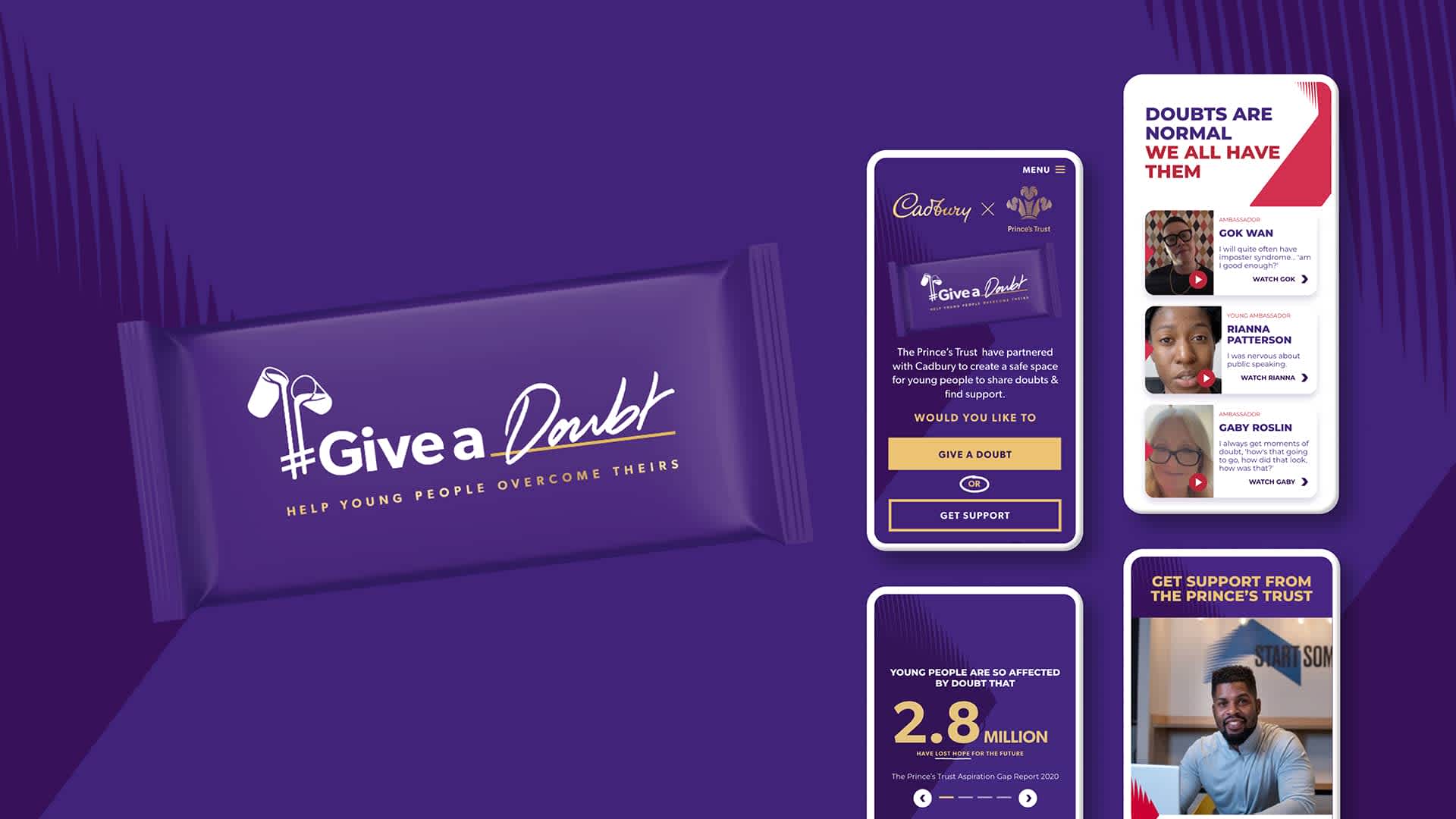
In 2020, The Prince’s Trust commissioned research called the ‘Aspiration Gap Report'. It found that 2.8 million young people in Britain have lost hope for the future, over 74% of 18–30 year olds are facing daily concerns around their future, and 34% have no confidence they’ll be able to meet their personal and professional goals. This shocked us, and spurred us into action with our client Cadbury and their partner, The Prince’s Trust.
We targeted the nation to get them sharing doubts, and youths to help them feel better. We helped turn hopelessness into hope.
Insight: When you realise everyone else has doubts, it becomes easier to overcome your own.
Idea: Give a Doubt. Help young people overcome theirs. We encouraged people around the UK to demonstrate that we all have doubts - we helped young people overcome their doubts and restore hope in their future.
Limited-edition chocolate bars were sold, featuring doubts from celebrities and QR codes for our ‘Give A Doubt’ website.
Visitors could help others by ‘giving a doubt’, or get support. The hub hosted celebrity doubt videos, gave advice on ‘giving a doubt’, and had support, advice, and guidance from The Prince’s Trust.
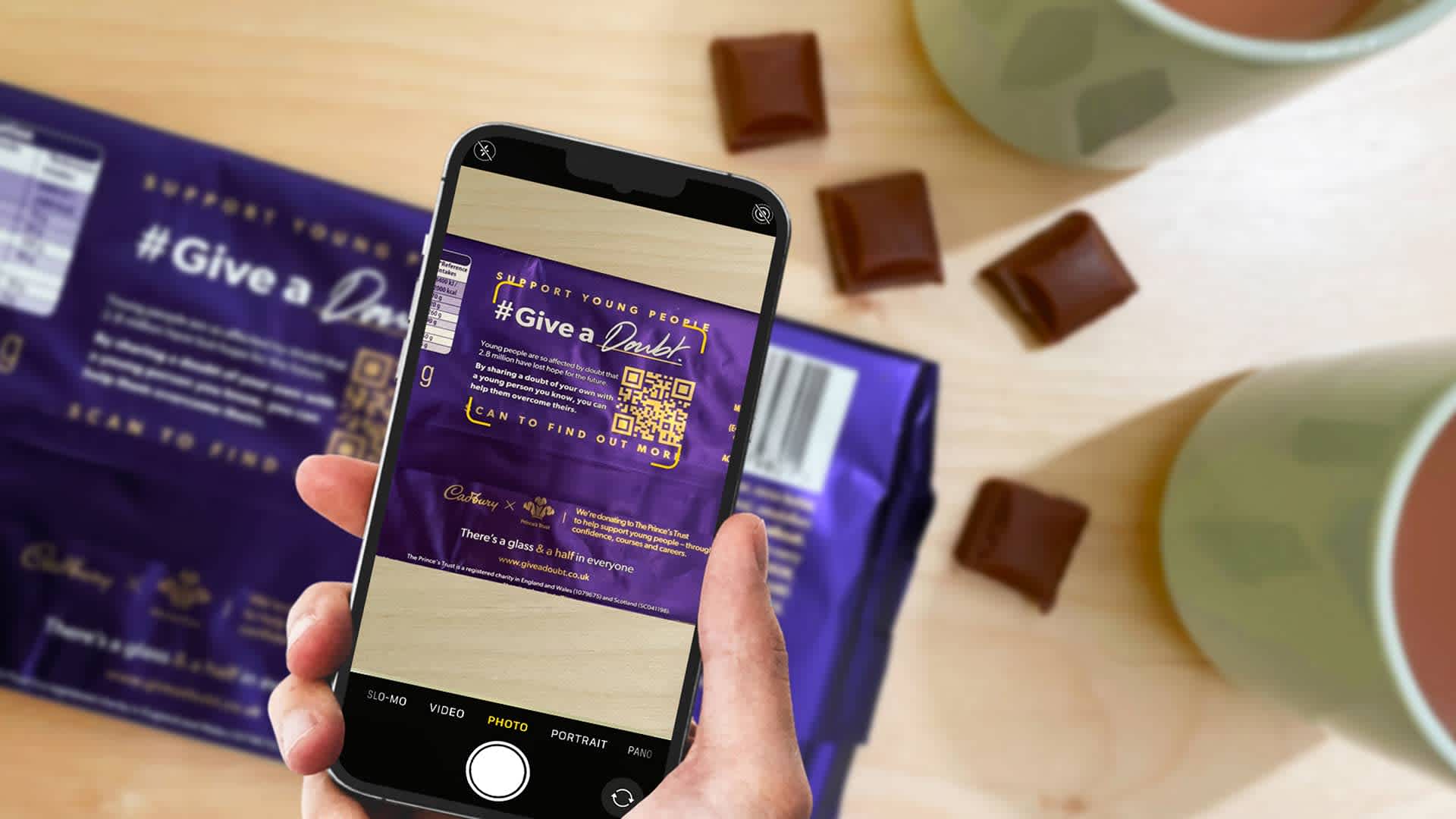
A small but innovative idea
Cadbury prides itself on generosity - going all the way back to the 1800s. In recent times, Cadbury have been turning their attention to encouraging the nation to be generous to others. By giving a doubt, people would be doing two generous things:
Making someone else feel better about their doubts
Selflessly sharing personal and private information about themselves
As a nation, we consume millions of chocolate bars - this idea was to make the bar into an initiator of a shared moment of vulnerability and support between two people. It would instigate conversation, be an excuse for a cuppa and a chat, a chance to break new ground between mother and son, uncle and niece or friends from different generations.
This small but innovative idea, from the purchase of a limited-edition ‘Give a doubt’ bar and a QR code scan, sparked the chance for over 33,000 people to hear from celebrities like Gok Wan, Konnie Huq and the Manchester United football team. All telling their stories of insecurity, imposter syndrome and generally doubting themselves - as well as igniting a conversation between our audience and someone they love, in real life.
This site was designed for two key audiences: those struggling with self doubt were directed to support from The Prince's Trust; and those who could help were given advice on how to approach a conversation with a young person, or refer them to The Prince's Trust.
Our approach
We approached this challenge in a very people-centric way, making sure that our focus remained clear around truly helping young people. We were prepared to sacrifice creative ideas if they had any possibility of doing more harm than good - a line we had to tread carefully around this sensitive topic.
Ideation
To kick off the project, we began by trying to envision what this hub website could be. What purpose would it serve? What functionality would it have? What journeys would we want the two audiences to go down? To do this we ran a number of ideation sessions, collaborating with our own designers, creatives and strategists, and members of The Prince's Trust - who know our target audience so well.
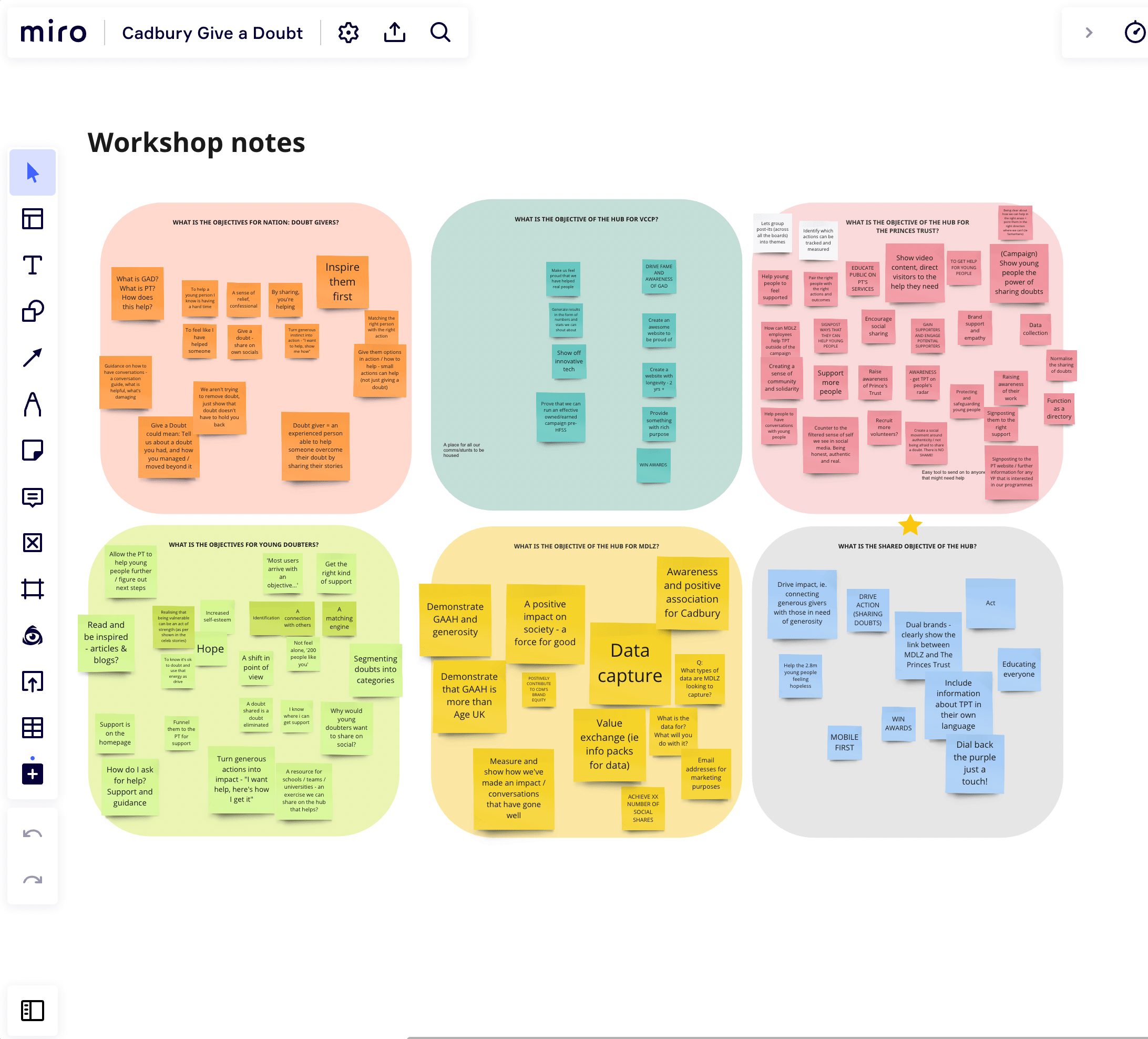
In order to ensure seamless integration between our UX, design and development teams we built a pipeline of artefacts, from each discipline - combining this with our bespoke CI/CD (continuous integration and continuous delivery) pipeline that automated component integration, quality assurance, and deployment - which let us rapidly move from concept to production.
With one of the key audiences being young people, almost everything in their world is on their mobile, plus with the majority of traffic coming to the hub site arriving via QR scan and social promotions, we took a mobile-first approach, optimising for vertical videos and easy to digest content.
During the detailed design phase, we faced a number of challenges:
how to speak to two audiences who have very differing needs
creating a digital 'action': how could we capture if someone would 'give a doubt' in real life
presenting multiple options: for The Prince's Trust services to young people, and ways to get involved, without overwhelming
bringing two very different brand worlds together. The iconic purple, white and gold of Cadbury, with the bright fuschia pink and white of The Prince’s Trust
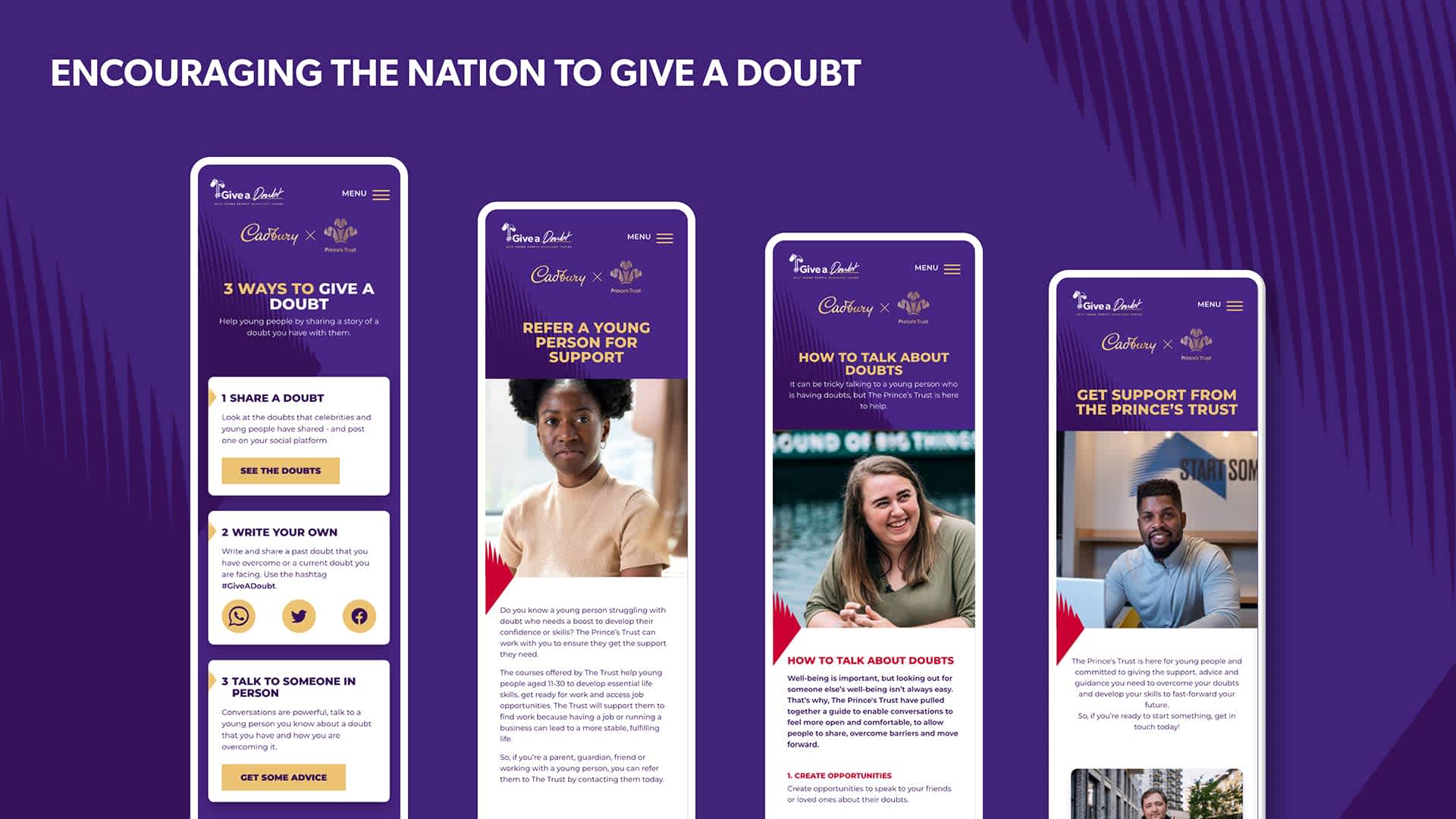
We also took an inclusive design approach by making sure that people at The Prince's Trust were involved throughout - giving us feedback from vitally different points of view to our own. As this campaign covered sensitive topics, it was critical that we sense-checked everything with the relevant audience. Web accessibility was also paramount in the implementation of any design and build, so we regularly checked our work against WCAG criteria.
Working as a multidisciplinary team in sprints, we were able to ensure all aspects of the build were tracked against key metrics for quality, performance and accessibility, with automated checks performed against every build to protect against regressions. This continued post launch with continued monitoring of the site’s performance with real users, allowing us to identify opportunities to tweak the experience for maximum effect.
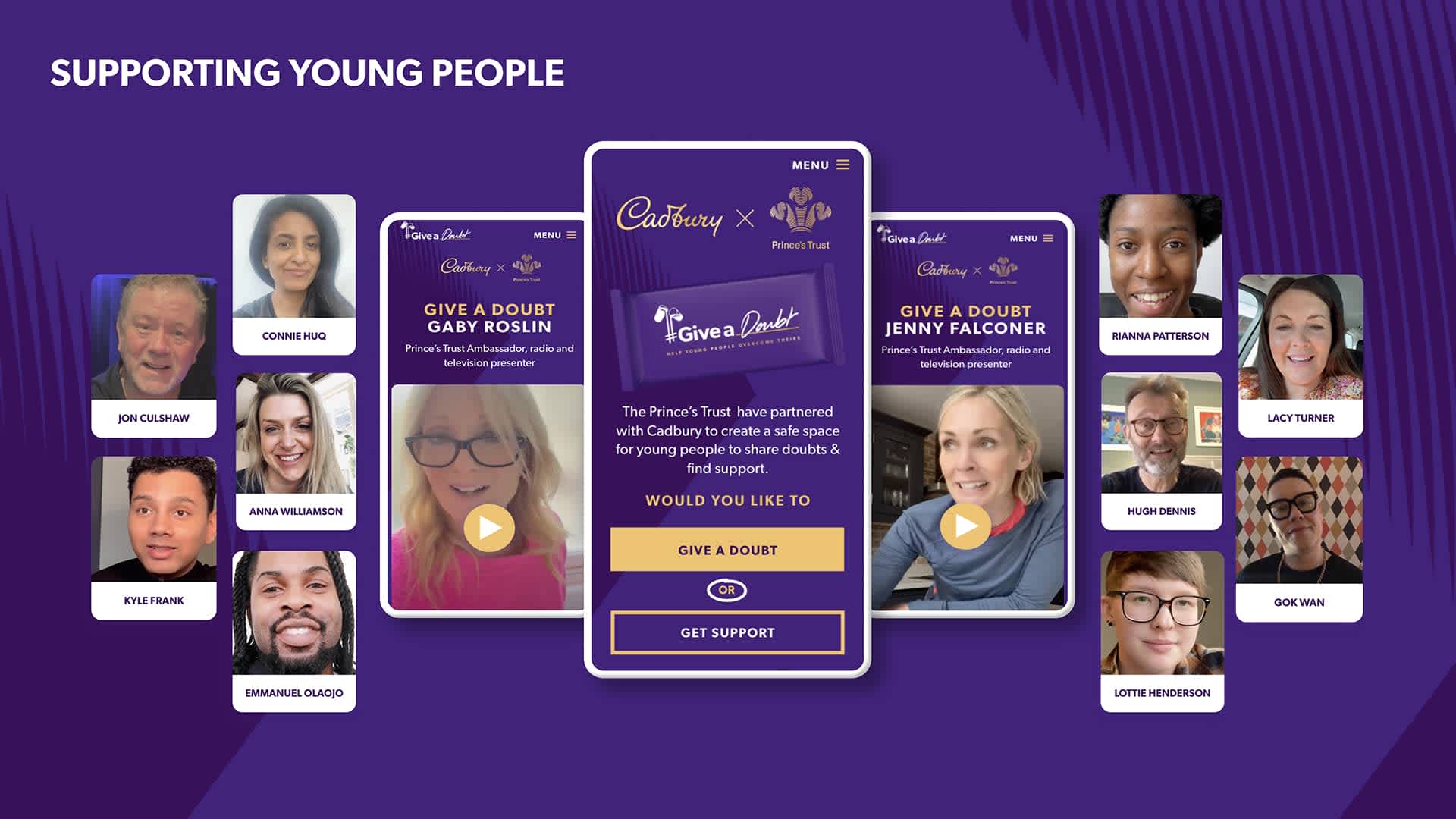
Impact
We are very proud to say that the Give a Doubt hub site was visited over 33,000 times, with people reaching it via the QR code, search, Facebook, TikTok and Instagram.
Many people visited because they wanted to help young people. We saw that an incredible 16,945 people went to the “Give a doubt” page. 1,020 visited “How to talk to a young person” and 830 looked at “How to refer a young person to The Prince’s Trust”.
We also saw that many people visited the hub to get support for themselves. Celebrity doubt videos received 3,898 visits and importantly, 2,200 people visited the ‘Get support” page. Finally we saw that almost 1,000 people went on to visit The Prince's Trust website - undoubtedly meaning that many people are now accessing their incredible services.
After visiting the website, we hope that people around the UK felt reassured and took the opportunity to start a meaningful conversation. Although we'll never be able to report statistics on how many conversations were started, we know that even if it was only one, we made a difference to someone's life.
ABOUT THE AUTHOR
STEPH MARQUES | HEAD OF UX
Steph has over 10 years experience of finding ways to bring business, customer and technology together into products and services that deliver and delight. She has worked with clients such as O2 on their digital transformation and innovation, Fortnum & Mason on their eCommerce platform and Saga on their website ecosystem redesign. Steph is passionate about Diversity & Inclusion, and leads the Accessibility Collective at Bernadette - evangelising and training the team in accessible design and development.

Let's talk
Got a business challenge that’s looking for an innovative digital solution? Or, perhaps you’re interested in joining our collective of digital pioneers? Maybe you just want to know a little more about what we do. In any case, we’d love to hear from you.